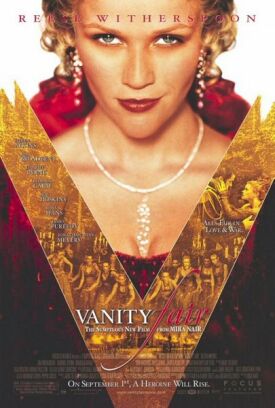Vanity Fair
(Reviewed September 1, 2004)
|
| Rating: |

|
|
|
Order this DVD or VHS Tape through Amazon.com
|
I don’t know why it is that film makers who obviously have no interest in classic novels as novels persist in adapting them for the silver screen. The latest is Vanity Fair by Mira Nair, who frankly acknowledges that she sees the great Victorian novel by William Makepeace Thackeray as "sort of excessive Monsoon Wedding" — her own biggest hit to date. Whatever else there is to be said about this as literary criticism, you’ve got to admit that it shows no interest in the real, the historical Thackeray. And indeed, apart from the story of an adventuress that is at its heart, she appears to have no interest in the book except as it provides an opportunity for her to restate a set of drearily predictable political opinions that are unmistakably of our own time. You’d think that, imprisoned in her contemporary opinions, she would welcome a chance to try on some unfamiliar ones, but for some reason movie-makers rarely do. They prefer to stick with what they know, and what they know — what Ms Nair knows — is that these olde tyme Brits were imperialists, racists and sexists who victimized poor Becky Sharp (Reese Witherspoon) because, I guess, it was just their nature to victimize people.
So that’s all sorted out for us then. Everything that we know of the characters, apart from Becky, we could have guessed before we ever met them, and Becky only recommends herself to us by being more like ourselves than any of the benighted Victorians among whom she has had the misfortune to be born. Meanwhile, a great many of the questions that would naturally appeal to the curiosity of anyone on first looking into the story — What was Becky after? Why was it attractive to her? Why is she poor but raised to live among the upper classes? Why are the other women being hateful to her? — are ignored or taken for granted. Above all, Thackeray’s ending — designed to show, as the title suggests, that worldly aspirations are a snare and a delusion — is simply dumped and Becky given a hopeful new start away from those snobbish English people in beautiful, unbuttoned India!
There are a great many anachronistic touches to this movie, not the least of them the scene in which Becky sings "Now Sleeps the Crimson Petal" by Tennyson, who was still a small child when the scene is supposed to have taken place, but none of them is as outrageous as this. Having accepted at face value the cynicism of Lord Steyne (Gabriel Byrne), who sees English society as a no more than a "tawdry puppet show," Miss Nair finds it natural to impose upon it her 20th century sense of the great good place beyond it among the subject peoples of the Empire. Victims of British oppression themselves, these unrepressed, authentic people-of-color are seen as offering a kind of politically correct refuge to their fellow victim of Victorian cruelty. Even Dobbin (Rhys Ifans), the only really sympathetic character other than Becky, is seen practising some kind of martial arts with an Indian comrade, obviously having "gone native" before returning to England to marry Amelia (Romola Garai).
Well, whatever may have been the truth of the relations between the British and India in the 19th century, we can be sure that it would not have appeared to Thackeray in this light, which is entirely the product of late 20th century academic neo-Marxism. Miss Nair is of course entitled to her opinions, but imposed upon this material they only succeed in making the original incomprehensible to us over and over again. What, for example, are we to make of the rejection by George Osborne (Jonathan Rhys Meyers) of the match proposed by his father (Jim Broadbent) with the rich Miss Schwartz (Kathryn Drysdale) in favor of the penniless Amelia? "What’s a shade or two of Tawny when there’s half a million on the table?" asks the old man, willing to overlook even his racism when money’s in question. When George asks "What of honor?" we have no more answer than his father does. We have seen nothing in George himself or in anyone else to prepare us for such an act of generosity, such a refusal to betray an obligation. Having presented him as a movie-villain up to this point — and again at the Duchess of Richmond’s ball — Miss Nair looks merely confused in allowing him so much inconsistent nobility. Thackeray, for whom honor was a familiar companion, makes it all perfectly understandable.
The only faint justification that this movie can claim for having been made is that Reese Witherspoon looks as if she was born to play the part of Becky Sharp — she is Becky Natural, as you might say. It’s a fine performance from a talented young woman, but one can only wish she had had more of a chance to give us Thackeray’s Becky instead of Miss Nair’s. 
[Top][Back]
|



